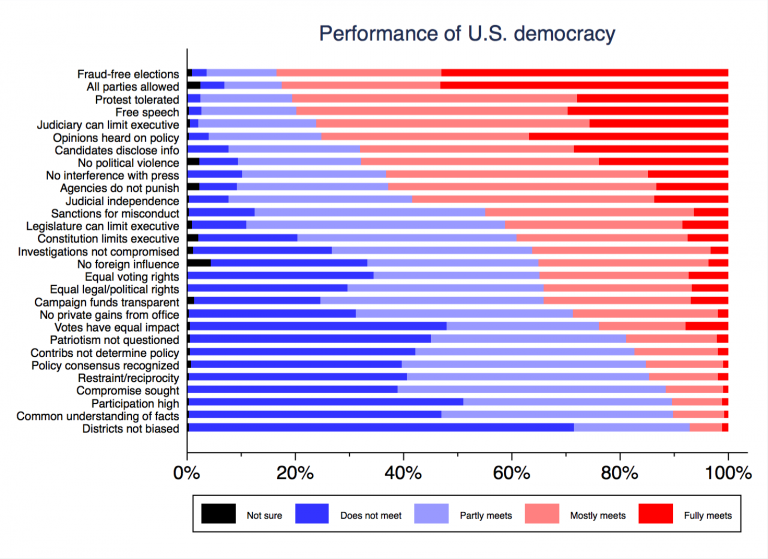The State of Democracy in America
Most people agree that government is necessary to maintain order, protect in a unified front against opposing forces, and help maintain public necessities such as education. The optimal type of government to do so however, may be debated. The popular opinion amongst Americans is that democracy is the best type of government when it comes to creating laws which represent the will of the people. This is because the very basis of democracy is citizens being able to rule, rather than an elite ruling body not elected by everyday people, such as a monarchy or oligarchy. The ideals of democracy allow for protection of human rights, legitimate policies resulting from the pooled opinions of voters, and evidence even supports it having economic benefits.
The U.S. democracy is certainly better attuned to the opinions of citizens than many governments around the world, but one may argue that it’s still a far way from being a true democracy. Traditionally, 5th century BCE Athens is recognized as being the closest government to true democracy to ever exist. This is because free men gathered to vote in assemblies, in what is known as a direct democracy. Since direct democracy is extremely inefficient, countries such as the United States have adopted representative democracies, in which representatives are elected.
The existence of political liberty and political equality are necessary for popular sovereignty, which is the idea that governed citizens are the ultimate form of authority. For popular sovereignty to continue, there must be free and fair elections which are competitive, a high level of participation from governed citizens, availability of honest, high-quality information for citizens, the majority vote rules, and the wishes of the governed are adhered to. While this structure works well in theory, objections include the threat of majority tyranny, uneducated and irrational voters, and minorities being ignored.
So what state is our democracy in today? To answer this question, the democracy-focused group Bright Line Watch invited political science faculty from 511 American institutions to participate in a three-part survey. Part two of the survey, which will be the portion discussed here, was taken shortly after President Trump’s first one hundred days in office. 1,126 participants ranked the United States on twenty-nine different democratic principles, categorized under “freedom of expression, quality of elections, accountability, political equality” and “norms of civility”.

The results demonstrate that while freedom of expression remains a highly adhered to democratic principle (72% of participants ranked the standard as mostly or fully met), political equality and norms of civility are struggling (28% and 14%, respectively, of participants ranked the standards as mostly or fully met). Concerning political and legal accountability, results are much more mixed. This may be due to the survey being conducted so close to President Trump’s firing of former FBI director James Comey, but also being affected shortly after by the Justice Department appointing Robert Mueller to lead an investigation into the extent of Russian involvement in the 2016 U.S. election, as well as any possibilities of collusion with campaign officials. These circumstances result in mixed rankings because one may represent an abuse of power, while the other is a check on executive power.
Therefore, while the United States may face some deterioration of democracy in the sense that maintaining a civil and fair political atmosphere isn’t highly-valued currently, it also remains to be one of the most successful and productive democracies in the world. The existence of free and fair elections, with candidates who act in accordance with the wishes of the people is fundamental to our ideals as a nation, and the results show that at least when it comes to liberty, and the freedom for people to control their own government, the United States is still considered a prosperous democracy.